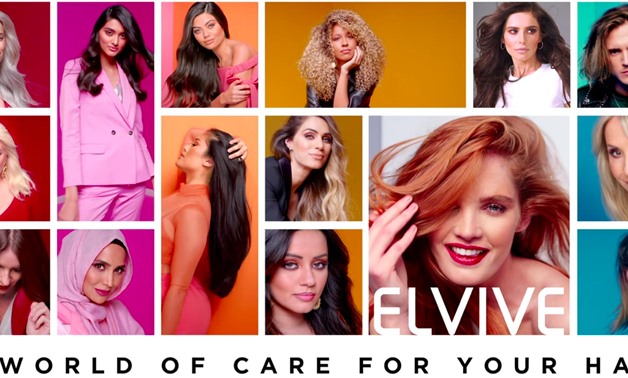
L’Oreal Paris Elvive campaign. Via L’Oreal official website
CAIRO – 28 January 2018: L’Oreal Paris Elvive recently unveiled their new #WorldofCare campaign for their existing products, and the internet went wild for their inclusion of a veiled woman in the mix of ambassadors. This is inclusion at its finest. L’Oreal Paris have featured, in a hair campaign, a woman who does not show her hair. It’s ostensibly groundbreaking, a clear step in the right direction. But for what seems like the hundredth time, L’Oreal has dropped the ball again.
I acknowledge the attempt at diversifying their campaigns: they have multiple ethnicities featured, different age ranges, a man, and different hair textures. But what bothers me is that, while everyone is head over heels over the fact that a hijab-wearing woman was included, no one is mentioning the fact that not one of the ambassadors has a skin tone that could even remotely be labeled darker than a light tan. We’ve drawn in one demographic, only to push out another. Where are the chocolate brown skin tones and their curly kinky hair, the coffee black skin tones and their afros and braids? The one woman who’s black has a caramel skin tone and her hair is dyed blonde and perfectly coiffed.
Elvive chose a group of British ambassadors and influencers including Cheryl, Alexina Graham, Dougie Poynter, Nadine Baggott, and Lydia Millen to celebrate and explore the unique, sometimes complex, but ultimately fascinating relationship they have with their hair. The campaign was photographed and directed by British photographer Rankin, and it is clearly meant to be inclusive, to show the different hair colors and styles and textures of its ambassadors.
The campaign has even gotten a lot of media coverage from publications like The Telegraph and British Vogue because, included in the group of ambassadors—amongst the white women, and the man and the women of Asian descent—is a hijab-wearing woman. Amena Khan, the woman herself, commented to British Vogue, “How many brands are doing things like this? Not many. They’re literally putting a girl in a headscarf—whose hair you can’t see—in a hair campaign. Because what they’re really valuing through the campaign, is the voices that we have.”
The cosmetics industry is great at preaching inclusion and then falling short of it. They make campaigns for everyone, but include only some people. There is a systematic and institutionalized racism and colorism in the cosmetics industry—likely in every industry—and it’s a reflection on society whether they admit it or not and whether they see it or not. Throwing in a veiled woman in this ad campaign and a black woman in that ad campaign doesn’t change anything and it doesn’t help. There needs to be systematic, consistent change or, as consumers, we’re applauding empty gestures and appeasements.
Is there not a black woman on the advertising team at Elvive who could look at the campaign and recognize that she didn't see herself in it? If there was a focus group, were there no black women or men included in it to offer their perspective? I’m speculating but an ad campaign is just the tip of the iceberg and these are questions that need to be asked—and answered.
The same lack of diversity is true of cosmetics brands that sell makeup. Just recently Tarte released two new foundations, with an initial shade range of just 15 shades, only three of which could be considered “dark.” They did announce that they would be releasing more shades, but who wants to be considered an afterthought? There are brands like MAC and Maybelline that release extensive, genuinely inclusive shade ranges for foundations and bases, but they couldn't be called a majority by any means. Considering Rihanna launched her Fenty Beauty line with 40 shades of foundation, clearly it’s possible and clearly it’s a choice.
Grand gestures of inclusivity in ad campaigns will not convince the masses if they are not well thought out and if they are not backed by meaningful change in the industry. More and more consumers are becoming socially aware and refusing to roll over on issues of diversity and equality. If companies want to continue to grow, they need to enact tangible change, not just hide behind facades of social responsibility and awareness.
At time of publishing Amena Khan had withdrawn from the #WorldofCarecampaign following the emergence of ‘anti-Israel’ tweets from 2014, and the resultant backlash. L’Oreal have stated that they support this decision.]

Comments
Leave a Comment